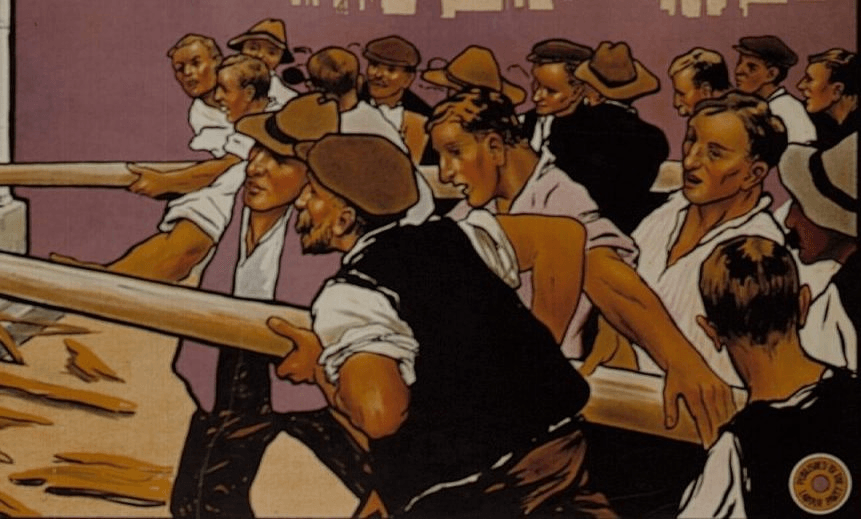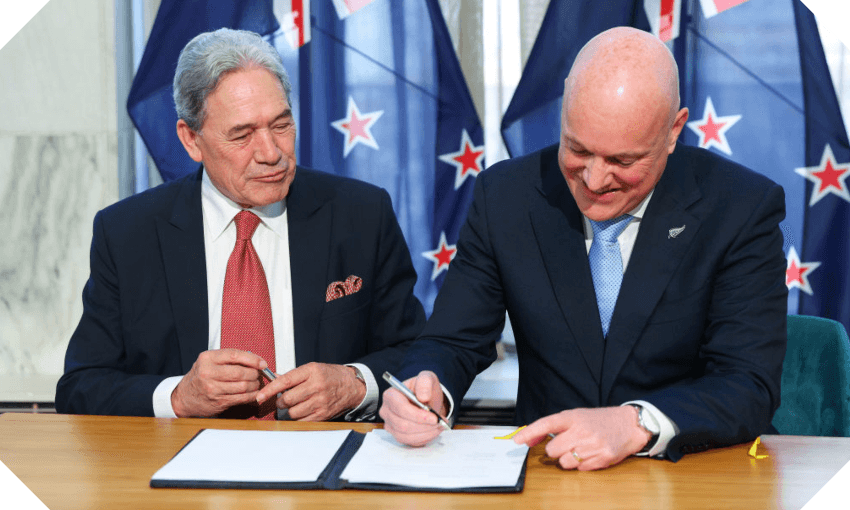Is identity politics destroying the Labour Party or is that just the catchcry of a bunch of old white guys trying to get their own way again? Is Labour really a broad church party? Here’s the third part of Simon Wilson’s analysis of Labour in 2017.
Identity politics
Shortly before Christmas a senior member of the Labour caucus told me that winning the election in 2017 requires his party to put an end to identity politics. He was a middle-class white male baby boomer and he said it without irony.
The identity politics debate is like a cancer eating out the strength and heart of the centre-left, and it doesn’t have to be like this.
It’s the debate that’s cancerous, mark, not the issues themselves. On the one side, in the wake of Brexit and Trump, we have the idea that the special concerns of women, ethnic minorities and other distinct groups have been given such prominence they have alienated the “mainstream”. That mainstream being largely white, poor and lower-middle-income people, especially men, especially outside the big urban centres. People for whom the left has stopped being a credible, let alone natural, political home.
On the other side, there are the activists of any number of progressive causes. They’re outraged at the suggestion they have caused the rise of the populist right and they’re appalled at its implications: stop talking about rape culture; casual racism really is just a bit of fun; the real problem is white men aren’t running things any more.
The right must really, really love this debate.
Read more in Simon Wilson’s series on the NZ Labour Party in election year 2017, including a 3-step plan to making Andrew Little an electable PM, here
In Britain, despite Brexit causing the fall of a Conservative prime minister, it is Labour, not the Tories, that’s been thrown into disarray. In the US, despite Hillary Clinton winning three million more votes than Trump, it’s the Democrats in trouble.
In this country, Labour struggles with the same debate. The party should focus on the things that matter to everyone, it is said: jobs and incomes, community safety, housing, health, education … Bills about abortion or euthanasia are a distraction, it is said: the party is not seriously concerned with the “mainstream”.
The biggest issue of all, the litmus test for the identity politics debate throughout the western world? Immigration. Inside the Labour Party here there’s a shit-storm brewing about it.
It’s particularly egregious that in most respects this debate doesn’t need to happen. The candidacy of Labour’s Michael Wood in the Mt Roskill byelection was instructive, in a good way. He focused on health, housing, transport, incomes: the “core issues”. But unlike the John Tamiheres of this world, he did it without feeling the need to dis feminism or other hallmarks of “identity politics”.
Wood joined the dots. A party committed to raising wages must also be committed to better parental leave, childcare support and equal pay for women. A party determined to resolve the housing needs of the destitute and the working poor must confront the complex issues involved on the basis of class and race.
Identity politics often exist within the core issues. Often, as with the examples above, they help define them. The task for Labour is to pursue the debates inclusively. Another example: marae justice panels have been running as an option for dealing with low-level offenders in three cities since 2014. They work pretty well. A Māori approach to something that disproportionately undermines Māori. They’re not the only solution, but they’re part of the mix. It’s not really hard to grasp.
A Labour Party that is bold and brave in advocating policies on those lines will do well. It will define itself as the party that fights on core issues in broad inclusive ways, and it will prevent identity politics disputes from corroding it from within.
As for rape culture, the debate is not going away and nor should it. If anyone wants to complain it hogs too many headlines, don’t blame the sexual violence campaigners. Blame the people who are not doing enough on the other issues.
And the euthanasia debate? Bring it on. Act MP David Seymour will be its promoter just as soon as his private member’s bill is drawn from the ballot and the vote will not be on party lines. National will not allow euthanasia to define it, so why should Labour? It’ll be busy doing the things it should be doing and not fretting about identity politics instead, won’t it?
The real problem for Labour in all this is that it doesn’t yet have a go-to policy to set the electorate alight. Last winter all sorts of New Zealanders were appalled to discover this is a country where some working families live in cars, but the opinion polls didn’t shift to Labour. Inequality and poverty are not hot-button issues – or not yet. They certainly could become so.
That’s why immigration is so important: it shifts the dial. And that’s why many in Labour are so anxious about identity politics: they want to talk about immigration but sensitivity to race issues has prevented them from having the necessary and constructive debate. That Labour MP I talked to before Christmas worried that “middle New Zealand” was missing out: “They blame immigrants,” he said. “Labour’s got to respond to that.”
True, it does. So, time to step up, Labour. Launch that debate. Own it, and conduct it with frankness, principle, facts and, above all, good ideas. Don’t say “names that sound Chinese”. Aim to unite the centre-left and all who might rally round with an economically useful and enlightened policy.
That, after all, is a core purpose of the Labour Party. Not to undermine the vital interests of some of its members and supporters but to build a broad coalition around a common programme.
The broad church
I’d have voted for Helen Kelly for prime minister. I’d have voted for David Shearer, too. I dearly wish I’d been given the chance to do both.
I know I’m not alone in identifying those two as pillars in Labour’s broad church. Or in thinking that everyone in Labour should value the breadth of membership those two reflect. That’s what broad church means: people with views as diverse as theirs, finding value in working out a common programme between them.
With Labour, though, you get the impression the party members who would have loved Kelly to become leader didn’t support Shearer, and vice versa.
This is because when it comes to party leadership, many Labour people are partisans: they vote for the candidate whose views most closely resemble their own. They don’t vote for the candidate whose skills and personality make them most likely to win the next election.
They forget that Shearer and Kelly were not poles apart. It’s David Seymour and Judith Collins who are poles apart from both of them. The enemy is not within. The enemy is the right. Inasmuch as there is an enemy within, it is sectarianism.
Labour people tend not to rate personality. They think it has corrupted politics. Policies are what matter, they say, and we need to return our political discourse to the realm of ideas, not obsess about the people who promote them. Helen Kelly believed this. In an interview played at her memorial service in Wellington last year she said politics should be “about values”. She added, “There’s far too much attention on leadership.”
It sounds sensible but sadly it’s not. It’s the idea that has done more damage to the Labour Party than any other since Rogernomics. Why? Because it keeps them out of power.
Helen Clark knew this and constantly tried to reinforce it: the primary goal of a political party is to win. You’re not there to watch. Being in opposition sucks.
National knows it, too. When they choose a leader they look for the person with the best chance of winning them the next election.
Of course it can be dangerous: the people who are really good at winning elections are demagogues. And for the ideologues it can also be disappointing: a lot of National’s more right-wing supporters wish John Key had governed with more purpose. On the whole, though, putting popularity ahead of policies has served National very well.
Helen Kelly herself was the best example on the left of why she was wrong. She wanted to enter parliament and become leader and she just might have been the member of her generation with the best chance of winning an election for the centre-left. She was a true leader: principled, determined and above all possessed of a likeable, admirable, trustworthy personality. People would have been thrilled to vote for her.
Andrew Little has very similar values to hers. And yet. People listened to her in a way they don’t to him.
The leadership of the Labour Party is not in play right now. But if they don’t do very well in the Mt Albert byelection it will be. More immediately, they’re deciding their electorate candidates and their party list.
What should guide them? All the candidates in winnable positions should be front-bench material and several of them should be potential leaders. Labour is short of top-tier talent and they need to address that right now.
This makes the broad church even more important. They won’t get enough talented, ambitious, likeable people who could become stars without actively promoting and supporting people across the breadth of the party.
The point of a broad church is not merely that it contains people with diverse points of view. It is that members embrace the breadth: that they support the talent whichever part of the organisation it comes from. Is Labour going to embrace that?
This is the third in a series on election year and the Labour Party, which will continue with: the great challenge of “social investment”, the lessons from Trump (they’re not what you think), and National’s Index of Shame.





